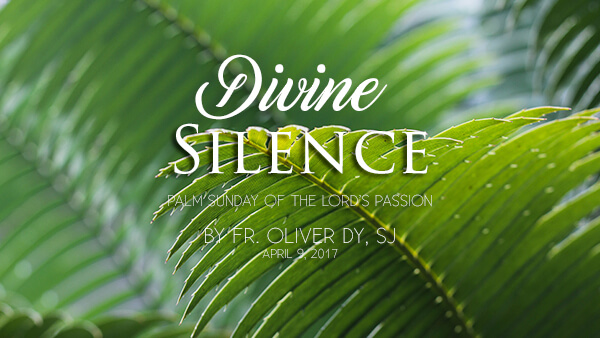


Fr. Oliver Dy, SJ
Palm Sunday of the Lord's Passion
April 9, 2017
Holy Week brings into focus that paradoxical interplay between noise and silence that make up the drama of human tragedy. The gospel read every Palm Sunday provides the overview of the final moments of the life of Jesus that we are by now familiar with. He is cheered on by the crowds carpeting the ground with palm branches, or else waving them. This was a customary welcome for people such as victorious military generals arriving home bringing the spoils of war. This moment of entry of Jesus to Jerusalem was therefore a demonstration of support, a show of force for the popular preacher and miracle-worker of Galilee.
Yet only a few days later, amid the religious festivities in Jerusalem, Jesus would be sentenced to die as a criminal in the eyes of the Roman law. Pontius Pilate, whose name is memorialized in the Apostle’s Creed, would cave in to the noisy pressure from the mob. This was no mere accident. It marks the success of a plot conceived and deliberated in secrecy, aided by a betrayer within Jesus’ own inner circle, and masterfully delivered at a precise moment of darkness. Thus the sudden shift of events and mood: someone so gloriously welcomed as a hero, in just a span of a few days, ends up as a tortured, bloodied, and asphyxiated body nailed to a wooden cross.
The story could have been different. In the garden, he prayed in private that he be spared from the bitter cup, but eventually embraced the inevitable. Upon capture, he could have commanded an army of angels to his rescue. When brought before trial, he could have eloquently defended his case as he always did during his earlier days as a gifted preacher, demolishing the tricky logic of his adversaries.
This divine silence during Holy Week is a sign of contradiction. The silence of an capably eloquent Jesus serves as a backdrop to that punitive side of human beings that prefers the noise of the whip on human flesh, the mockery of soldiers accompanying the crowning of thorns, the dragging of heavy wood around which his arms are tied, the pounding of the hammer on nails driven through human flesh, and the asphyxiating breaths of a bloodied and naked body hanging on to dear life on an elevated cross. This is a spectacle of punishment meant to induce fear. Fear is necessary for the creation and maintenance of an empire. Without such fear, there would be no order among its subjects.
Today, Palm Sunday, we hear the rattle of the leaves as they are waved in the air to welcome the messiah. Tomorrow, the palm branches would be burned to become the dust that would bless the foreheads of Christians during Ash Wednesday. Why did Jesus not simply march to the beating of our own drums? Why couldn’t he simply become a messiah cast in our own image? Where is the wisdom in becoming a victim when one could very well prove oneself before others to be the victor? In choosing to become a sign of contradiction, Jesus simply reduces the Christian to silence.
Edward Yang on April 13, 2017 AT 07 am
Now I am beginning to understand the act of dying to oneself through silence with prayer that I can continuously do so for the remaining years of my life by totally learning and practicing to see JESUS in the other. Thank you
Comments are closed.